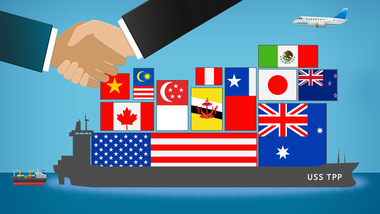Anti-TPP chants erupt at DNC

by Austin Stallings
Journalism Intern
Viewers of the Democratic National Convention have more than likely noticed the signs in the audience with the slogan “#StopTPP” as well as chanting from various sections of the audience.
TPP stands for Trans-Pacific Partnership, a free-trade agreement between the United States and 11 other countries. The other participating countries are Australia, Brunei Darussalam, Canada, Chile, Japan, Malaysia, Mexico, New Zealand, Peru, Singapore, the United States, and Vietnam.
The involved countries produce about 40% of the World’s GDP, 26% of the World’s trade, and 793 million of the World’s consumers, the deal is even bigger than the North American Free Trade Agreement.
The deal is meant to balance the trade dominance of both China and India in East Asia. A notable quality of the deal is that it excludes China, however, China is showing interest in joining. This trade alliance also gives the United States an excuse to intervene in trade disputes in the South China Sea.
Like any deal, there are positives and negatives, and as the start of the Democratic National Convention has proven, the deal faces heavy opposition from Democrats despite support from President Obama.
A few positives surrounding TPP is the natural boosts that will result in exports and economic growth. Which will, in turn, create more jobs and prosperity for the countries involved, exports are said to increase by 305 billion per year by 2025.
U.S exports would increase by 123.5 billion, focusing on machinery, such as electrical, autos, plastics, and agricultural industries.
It does this by removing 18,000 tariffs placed on U.S. exports to other countries. The United States has already withdrawn 80% of these tariffs on foreign imports. The TPP serves to level the playing field.
However, most of the gains experienced under the Trans-Pacific Partnership would only benefit workers making over $88,000 a year. That statement piece of information alone indicates that this initiative does more to contribute to income inequality than it does to correct it. By promoting cheaper goods in low-wage countries, free trade agreements create income inequality in high-wage countries.
TPP also poses a risk to the environment as competitive practices will reduce incentives in Asian countries to protect the environment.
Lastly, the TPP makes the Auto Industry more vulnerable to migrating factories, which could lead to lost jobs, as well as lower priced cars.
The TPP has not gone into effect yet, and as of right now, faces heavy opposition from Democrats.
Copyright The Gayly 7/25/16 @ 7:15 p.m. CDT





